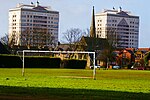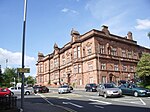Cliftonhill
Albion Rovers F.C.CoatbridgeDefunct greyhound racing venues in the United KingdomDefunct speedway venues in ScotlandDumbarton F.C. ... and 7 more
Football venues in ScotlandGreyhound racing in ScotlandHamilton Academical F.C.Scottish Football League venuesScottish Professional Football League venuesSports venues completed in 1919Sports venues in North Lanarkshire

Cliftonhill Stadium, commonly known as Cliftonhill and currently 'The Reigart Stadium' for sponsorship purposes, is a football stadium in Coatbridge, North Lanarkshire, Scotland. It is the home ground of former Scottish Professional Football League team Albion Rovers F.C., who have played at the ground since 1919.
Excerpt from the Wikipedia article Cliftonhill (License: CC BY-SA 3.0, Authors, Images).Cliftonhill
Main Street,
Geographical coordinates (GPS) Address External links Nearby Places Show on map
Geographical coordinates (GPS)
| Latitude | Longitude |
|---|---|
| N 55.860277777778 ° | E -4.0113888888889 ° |
Address
Cliftonhill Stadium
Main Street
ML5 3RB , Whifflet
Scotland, United Kingdom
Open on Google Maps






